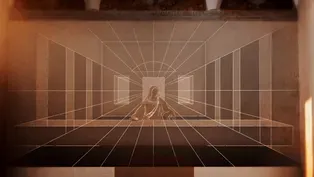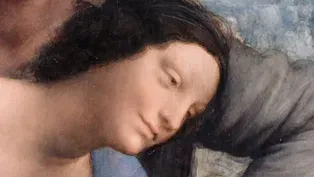PBS Presents
Mona Lisa Clip
Clip: Special | 8m 20sVideo has Closed Captions
Mona Lisa Clip
Mona Lisa Clip
Problems with Closed Captions? Closed Captioning Feedback
Problems with Closed Captions? Closed Captioning Feedback
PBS Presents
Mona Lisa Clip
Clip: Special | 8m 20sVideo has Closed Captions
Mona Lisa Clip
Problems with Closed Captions? Closed Captioning Feedback
How to Watch PBS Presents
PBS Presents is available to stream on pbs.org and the free PBS App, available on iPhone, Apple TV, Android TV, Android smartphones, Amazon Fire TV, Amazon Fire Tablet, Roku, Samsung Smart TV, and Vizio.
[Church bells ringing] Narrator: In 1516, Giuliano de' Medici died of tuberculosis.
With his patron gone, Leonardo accepted an invitation that would take him beyond Italy for the first time in his life.
Francis I, the charismatic 21-year-old King of France, was building a court at his chateau in Amboise to enhance his reputation as an enlightened and cultured monarch.
Leonardo, now 64 years old, packed all his belongings and--traveling by mule with Francesco Melzi, Salai, and a new servant named Battista de Vilanis-- headed north over the Alps toward the Loire River Valley of France.
He did not expect to return.
♪ The king installed Leonardo at the Chateau de Cloux, an elegant manor house down the road from his castle at Amboise.
He paid Leonardo a generous salary and provided him with a housekeeper who prepared his meals.
Kemp: Francis I is very ambitious in military terms but also in cultural terms.
He knows the Renaissance, what the Italians are doing is the hot thing, and he wants to buy into that Italianate-Renaissance culture, and Leonardo was clearly a kind of tourist attraction for Francis' court.
He could say, "I've got the greatest artist in the world down here."
[Bramly speaking French] ♪ Narrator: The Italian sculptor Benvenuto Cellini said that Francis was "besotted with those great virtues of Leonardo's."
The king "could never believe there was another man born in this world who knew as much."
♪ [Vecce speaking Italian] Narrator: Leonardo had finally found the perfect patron.
He staged spectacles as he had in Milan and sketched designs for a new royal palace at Romorantin that was never built.
♪ What may have been a small stroke made painting difficult, but he continued to draw and to teach.
[Bramly speaking French] Narrator: In October 1517, Leonardo received a visit from an acquaintance he'd met in Rome-- Cardinal Luigi d'Aragona.
During a tour of his studio, Leonardo proudly shared his manuscripts, which the Cardinal's assistant described as an "infinity of volumes," as well as several unfinished paintings that he'd carried with him from Rome.
They included a mysterious and sensual likeness of Saint John the Baptist and his depiction of The Virgin and Child with Saint Anne.
♪ Leonardo also showed them a portrait of Lisa del Giocondo, the wife of a well-to-do Florentine silk merchant, which he had been commissioned to paint 14 years earlier.
♪ At the time, she had been 24 years old and was the mother of 5 children.
Leonardo had carried the painting from Florence to Milan, then to Rome, and finally over the Alps to France.
♪ Like many of his works, it had over time become something more than a commission.
Kemp: He's poured into that painting his knowledge of the microcosm, the body of the woman, the body of nature, the movement of hair... light on surfaces, atmospheric perspective in the landscape, so he's taken this straightforward subject and turned it into something wonderful.
It ceases to become a functional likeness, and it becomes a statement about the woman in nature.
It becomes a statement about the beloved woman equivalent to the Italian poetry, the woman who is idealized into some sublimated form who's completely unbelievable in a way.
♪ Man as Leonardo: The earth has a living soul, and its flesh is the soil.
Its bones are the strata and structures of the rocks which form the mountains.
[Birds chirping] ♪ Its blood is its veins of water.
♪ The pool of blood around the heart is the ocean.
♪ Its breathing, by the rise and fall of blood through the pulses is likewise, in the earth, the ebb and flow of the sea; ♪ [Speaking Italian] ♪
Providing Support for PBS.org
Learn Moreabout PBS online sponsorship












